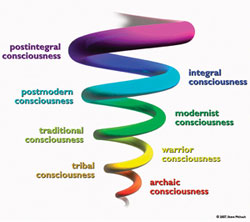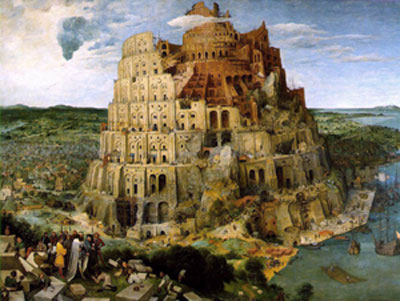|
TRANSLATE THIS ARTICLE
Integral World: Exploring Theories of Everything
An independent forum for a critical discussion of the integral philosophy of Ken Wilber
Institute for Cultural Evolution goes LiveIs there room for more radical alternatives?Jeremy Johnson"You never change things by fighting the existing reality. To change something, build a new model that makes the existing model obsolete." —Buckminster Fuller
The Institute for Cultural Evolution launched today. Founded by Steve McIntosh, Carter Phipps, Elizabeth Debold and Michael Zimmerman the non-profit is dedicated to combating climate change and important world issues by a unique, peace-making and developmental approach. Based on Integral Theory, a socio-cultural framework developed by Ken Wilber, the think tank promises to alleviate “grid-lock” in politics by bridging the gap between conservatives and progressives, ecological activists and white collar corporate culture. I’m interested to see what will happen when the rubber hits the road for Integral Theory. Although more loosely based on Ken Wilber’s philosophy – McIntosh being an independent thinker – the foundational principles are largely the same. I remain wary after the publication of “Integral Trans-Partisan Politics,” over at Integral Life, which inspired a joint publication/response over at Beams and Struts [Eight Perspectives On Integral Trans-Partisan Politics]. I hope that this new think tank takes a broader, and more diverse approach to social problems. The largest concern, going forward, is whether or not Integral Theory is capable of addressing the systemic crisis the US and other global powers are facing. What I would love to hear addressed by the founders of this think tank are: 
In Beams and Struts article, Eight Perspectives on Integral Trans-Partisan Politics, Trevor Malkinson posted a comment in response to Joe Corbett, highlighting a few words by Joe that I think hit the nail on the head with my concern: “Change does not come by working with your opponents, the vested interests of out-moded powers, but rather by seizing power from them for yourself and imposing change from above… so for me, the discussion of integral trans-partisan politics really shifts to how power can be siezed from the corporate mainstream and regulated out of existence through alternative principles, before its too late for all of us and countless other species on this planet.”  Now, it’s a given that the Institute for Cultural Evolution will emphasize climate change as one of its central focuses. I can appreciate that goal and find it a noble endeavor. But I wonder if it is, ultimately, a wrong turn for the institute to be working on appealing to the ossified, established, and caked layers of thinking in modern society. Might more radical turns be necessary in order to enact a cultural transformation, the very thing that Integral Theory is encouraging? Joe writes this: “The powers that be have no serious intention of helping the transition along. Therefore, there must be two fronts of change: one, to build alternative systems, and two, to bring an end as soon as possible to cporporate capitalism by arresting and seizing power whenever and wherever the opportunities emerge, and by whatever integral means necessary.” Trevor chimed in with Joe by saying, “elite power does not give up control of its power easily, and as a recent book has argued/shown historically, the clinging to power and the greed of the elite often lead to societal collapse.” Now, if you’ve read your historians and cultural philosophers, like Jean Gebser (one of the foundational thinkers of contemporary talk on “cultural evolution”), you know what Trevor says is true throughout history. The established excellence of a culture, which once brought it prosperity, eventually becomes outdated; it decays from within, refusing to change or perhaps ignoring the pleas of the people to make systemic revisions. These cultures collapse. A study of historical “dark ages”, as William Irwin Thompson noted in his book, Coming into Being: Artifacts and Texts in the Evolution of Consciousness, also demonstrates to us that it is indeed a rare thing for the established powers of any culture to give up their choke-hold. This creates a dilemma for any modern institute facing our current global predicament. The first approach would be to recognize, to begin with, that the established government, social system, etc. often experiences a decline before any new cultural transformation takes place. History is not a line of neat, developmental unfoldment (to be fair, Phipps and McIntosh often acknowledge this), but a story of fits and starts. Bursts of flourishing followed by Dark Ages. Punctuated equilibrium. If there is any progress, it happens by means of a labyrinth and not a ladder. This puts a think tank like the Institute for Cultural Evolution in a dilemma. Who do they appeal to? Do they attempt to solve the “culture wars” by appealing to the squabbling on board the sinking ship? Attempting to get everyone to work on building alternative systems, gradually getting them to listen. Even if this did work, which seems doubtful (as there is little historical precedent), can we afford the time? The second approach, as I see it, is to take the radical alternative. Don’t appeal to the established authorities. Put your mind and heart, your brilliance and creative genius into articulating whole new systems. Work on building those systems. Cater them, not with other evolutionary theorists in mind, but for the everyday people. Build things that work and appeal to billions around the Earth. This is Joe’s position: “build alternatives.” This is where you can do the most good for the most people, especially if you recognize the first step, which is recognizing that appealing to the established powers won’t do much good. You must build it yourself. Now, Joe’s next position: “to bring an end… by seizing power… wherever opportunities emerge.” Now this is where things get tougher, and more radical. The challenges here are twofold. The alternative systems we build: economic, ecological, social, cultural, and even religious, can’t be “anti-establishment,” in the sense that they are defined by being an anti-thesis. They must instead be called forth as a pro-active alternative system. To quote Buckminster Fuller’s well known axiom:  Buckminster Fuller “You never change things by fighting the existing reality. To change something, build a new model that makes the existing model obsolete.” This has to be done without demonizing the older systems and modes of thinking on one hand, while not trying to cater to them either. The “seizing” of “power” must be done as a means to bring forth a new vision, not conquer an old one. Fuller also famously said, “the best way to predict the future is to design it,” and so the younger generations will do no good trying to work with established value systems. They must step into new territories, invent systems of their own and start building them for everyone. So, how effective will the institute be if it is working within the system that is falling apart?
So, how effective will the institute be if it is working within the system that is falling apart? To be fair, part of this has to do with Integral Theory’s interpretation of older systems: that they are developmental and valuable to “include” as we go forward. While I do agree with this attitude, generally, in practical terms I am unsure how we might do this. The answer, it seems to me anyway, is to forge ahead. The new system must be bigger than the older one. It must be complex enough to handle an ecology of cultures, climate change, and world politics. And in that sense, it can “include them.” But the answer to all of these challenges lies in the hands of the new, younger generations. And part of this solution might be in the rise of digital networks, the new economic and social policies they instill in the 21st century generations, and the brilliant new enterprises they might take up to confront and break free from the older institutions. This video by Douglass Rushkoff, speaking about centralized vs. decentralized currencies is part of that new kind of radical thinking that we might have to enact in this century. This is where I’d place my bets on for the future. Rushkoff suggests that the money system we enact today is “incompatible” with a digital world. We must make a radical break: The replacement of older institutions, and social systems, by newer ones, is integral to cultural evolution. The old mentalities of past epochs break down into the goo like in an insect’s metamorphosis; proponents of integral theory and cultural evolution should know this well, that the dark side of cultural transformation are the bifurcations that present themselves at critical juncture points. The spine is broken and the organs no longer function. All pathways lead down into the abyss, should we not enact a leap into some new mutation. This was how Gebser saw the new developments in culture and consciousness. Let’s ask ourselves carefully if we are sufficiently being present and mindful enough in our discourse – witnessing the Dark Age and breakdown – to contribute to alleviating the crisis today. In my perspective, we must leap in with a totally new mentality if we are going to prevent (or simply alleviate) entering another Dark Age. Compromise and consolidation are simply not enough. The leaps are discontinuous; so let’s put our all into planting the seeds for the next civilization to take root. Drop the old robes, they will only bear down the weight of centuries on you. To take the next step, all of us are going to have to think in radically new ways, and find means to “grow down” that radical vision to support everyone. Finally, we must consider the possibility that cultural evolution, like the biological one, does not always transcend and include. Extinction is a distinct possibility. Will the Institute for Cultural Evolution address these questions? Will it hold space for more radical and, arguably, less conservative evolutionary theories, such as the ones detailed here? Here’s hoping that they do.
|